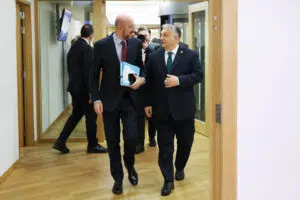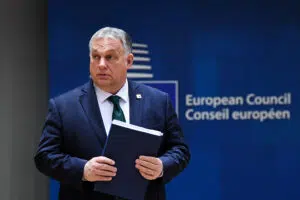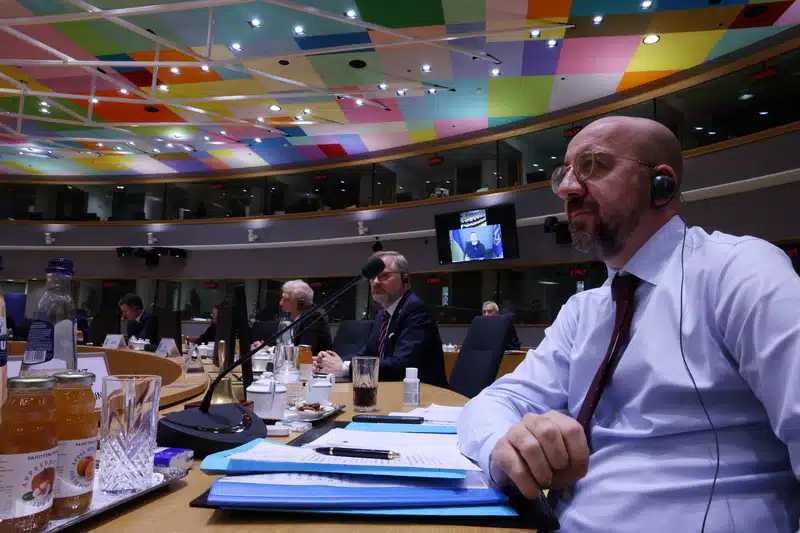Brussels – There is an understanding. Surprisingly, when a day of long stalemates was feared, the president of the European Council, Charles Michel, announced this morning (Feb. 1) with a post on X that “all 27 leaders have agreedon an additional support package of 50 billion euros for Ukraine within the EU budget.” An agreement that thus makes it possible to achieve the much-desired solution to Twenty-seven and overcome the resistance of the Hungarian premier, Viktor Orbán, to financial support for Kiev within the mid-term review of the Multiannual Financial Framework 2021-2027 (MFF).

“This guarantees Ukraine steady, long-term and predictable funding,” the European Council number one reminded, making it clear that “the EU is taking leadership and responsibility for support to Ukraine, we know what is at stake.” Making decisive in averting the “Twenty-six” option were the consultations before the start of the extraordinary summit between the President of the European Council, Charles Michel, of the EU Commission, Ursula von der Leyen, the Italian premier, Giorgia Meloni, the French president, Emmanuel Macron, the German chancellor, Olaf Scholz, and Orbán himself. A necessary mediation in order not to exasperate positions, in what – as we learn from qualified sources – is considered a decisive and crossroads moment to define the very future of the Union. “We have already had difficult councils, but we have always found a solution,our only goal is a solution in Twenty-seven,” Belgian Prime Minister and rotating president of the EU Council, Alexander De Croo, explained clearly.
Una giornata importante per l’Europa. L’Ucraina avrà il nostro sostegno per tutto il tempo necessario a raggiungere una pace giusta. #Ue più forte delle proprie divisioni https://t.co/TX01U34yhe
— Paolo Gentiloni (@PaoloGentiloni) February 1, 2024
According to qualified sources, the agreement originated from a conversation between Michel and Macron late last night (Jan. 31) and then developed into smaller and larger groups this morning to go in search of the necessary openings for a compromise, with the idea then accepted by the Hungarian premier. Pending the publication of the conclusions regarding the revision of the multi-year budget, the same sources let it be known that there were two additions. The first is that of the paragraph specifying that “in two years the Council shall invite the Commission to make a proposal for a revision in the context of the new MFF.” This is only “if necessary” and “unanimity will be needed” to invite the EU executive to make the proposal-sources specify-but there will be no annual as initially requested by Budapest discussions.

Instead, the second addition would be that “the Council recalls its December 2020 decisions on the application of the conditionality mechanism” on the rule of law, which is currently holding up funds under Hungary’s €10.4 billion National Recovery and Resilience Plan (NRPR) (only €900 million automatic pre-funding from the RePowerEu chapter have been unlocked) and the €6.3 billion from the Cohesion Policy frozen from the end of 2022. The reference in particular is that related to the principles of proportionality and causality when the EU Commission must decide on the disbursement of funds to Hungary or other member countries. “Measures under the mechanism will have to be proportionate to the impact of the violations of the rule of law on the sound financial management of the Union budget or on the Union’s financial interests,” and the causal link between the violations and the negative consequences “will have to be sufficiently direct and duly established,” the 2020 Summit conclusioni reads: “The mere finding of a violation of the rule of law is not sufficient to trigger the mechanism.”
Satisfied is the president of the European Parliament, Roberta Metsola. “Today is a good day for Europe,” she commented at a press conference held after the meeting with heads of state and government. “We have reached an agreement, thanks to the intensive work done by our leaders. What our citizens want to see are solutions, not divisions.” Now Parliament and its departments will get to work. “We need to verify the details of this agreement. We will read it politically and legally.” Overall, however, the understanding is good news, especially from an image and reputation point of view. “This agreement offers predictability and credibility of the EU towards Ukraine, which is part of the European family. For the European Parliament, there was no other option than this.”
English version by the Translation Service of Withub






